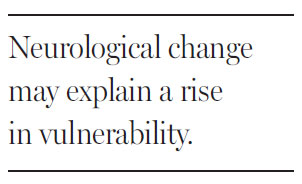Aging brains miss some important clues
Updated: 2013-01-13 07:49
By Judith Graham(The New York Times)
|
|||||||||

There's a reason so many older people fall for financial scams, new research suggests. They don't respond as readily to visual cues that suggest a person might be untrustworthy, and their brains don't send out as many warning signals that ignite a danger-ahead gut response.
The research, published in December in the Proceedings of the National Academy of Sciences, shows that older adults' vulnerability may be rooted in age-related neurological changes.
Researchers from the University of California, Los Angeles, found that an area of the brain was muted when older people looked at photographs of suspicious-looking individuals. Known as the anterior insula, that area activates gut-level feelings that help individuals assess risks.
Adults were asked to evaluate the trustworthiness of people portrayed in 60 photographs while undergoing brain scans. When those ages 23 to 46 labeled a person "not trustworthy," their anterior insulas lighted up. But this wasn't true for those ages 55 to 80.
"The warning signals that convey a sense of potential danger to younger adults just don't seem to be there," said Shelley Taylor, the lead researcher.
Researchers also asked 119 older adults (ages 55 to 84) and 24 younger adults (ages 20 to 42) to rate people in photographs as trustworthy, neutral or untrustworthy.
Signs that they were potentially untrustworthy included insincere smiles, averted gazes and postures that "leaned away" rather than toward the camera, among others, Dr. Taylor said.
Older adults were found to be equally adept at identifying people judged to be trustworthy or neutral, but they were much more likely to miss signs of those who may be untrustworthy.
"We believe what's going on is that older adults have a bias toward positive emotional experience and this keeps them from recognizing negative cues," Dr.Taylor said.
Alexander Todorov, a professor of psychology at Princeton University in New Jersey, called the findings "interesting," but warned that "there is an implicit assumption that these trustworthiness evaluations based on facial appearance are accurate. This is far from clear."
Dr.Taylor became acutely aware of fraud targeting the elderly almost 20 years ago when her father handed $17,000 to two men who approached him and walked with him to his bank.
She thought the men would have been viewed suspiciously by most people but they weren't seen that way by her father.
Dr.Taylor advises that seniors never agree immediately to an offer: "Hang up or wait and get someone else involved in your life to evaluate what's being presented."
The New York Times
(China Daily 01/13/2013 page11)